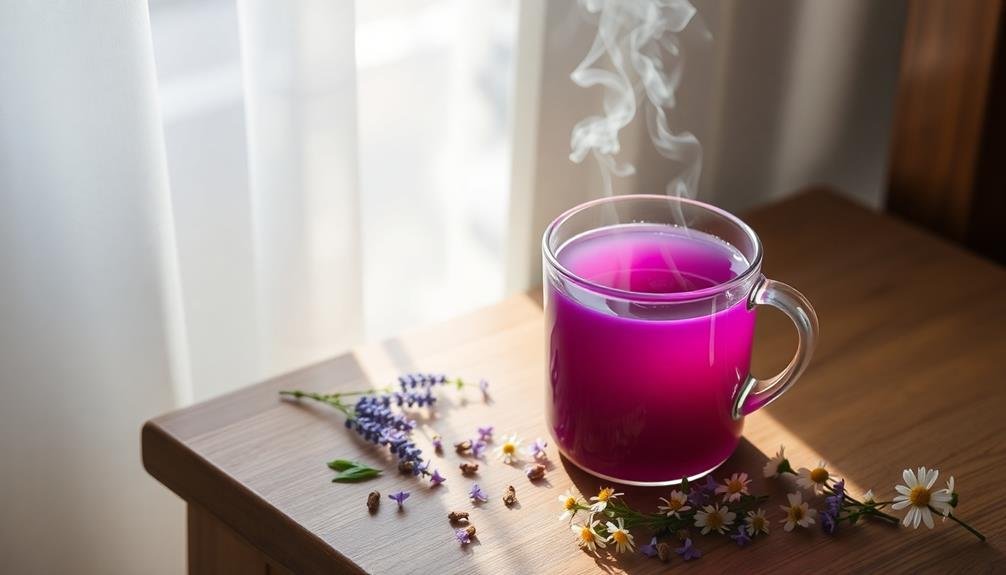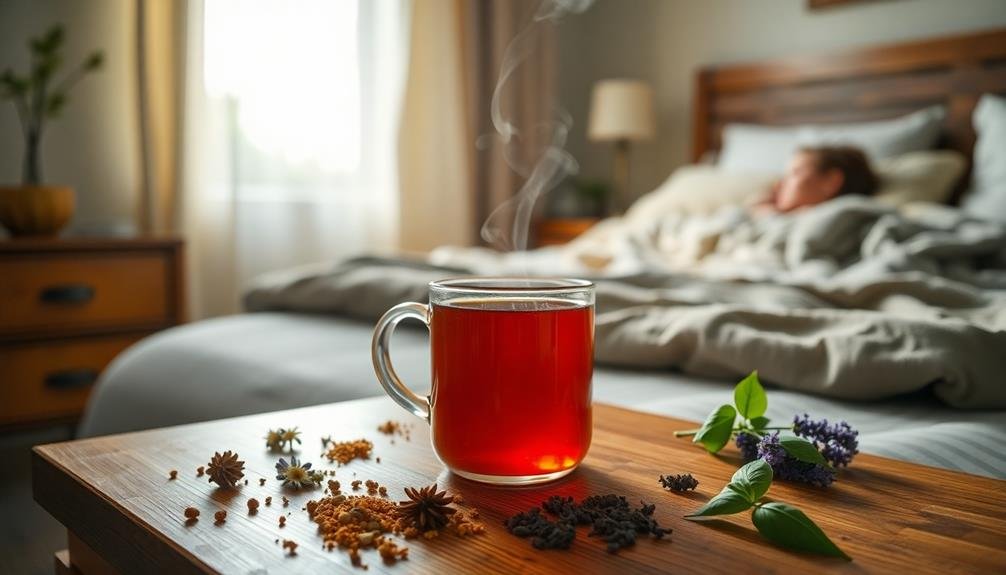Enhance your sleep quality with these seven adaptogenic herbs for a soothing bedtime tea. Ashwagandha reduces cortisol, easing stress and promoting deep sleep. Rhodiola rosea regulates your sleep-wake cycle by balancing neurotransmitters. Holy basil, an Ayurvedic favorite, calms anxiety and fosters relaxation. Schisandra berries improve sleep duration and mental clarity. Eleuthero root stabilizes blood sugar, reducing nighttime awakenings. Licorice root offers anti-inflammatory benefits and regulates cortisol. Finally, reishi mushroom helps you fall asleep faster and stay asleep longer. By incorporating these powerful adaptogens into your nightly routine, you'll reveal the secrets to restorative sleep and overall well-being.
Ashwagandha: The Sleep-Inducing Root

Among adaptogenic herbs, Ashwagandha stands out as a powerful sleep aid. This ancient Ayurvedic root has been used for centuries to promote relaxation and improve sleep quality. When you're looking to enhance your sleep tea blend, Ashwagandha should be at the top of your list.
Ashwagandha works by reducing cortisol levels in your body, helping to alleviate stress and anxiety that often interfere with a good night's rest. It's particularly effective in combating insomnia and promoting deep, restorative sleep. You'll find that regular consumption of Ashwagandha can lead to improved sleep onset, duration, and overall sleep efficiency.
To incorporate Ashwagandha into your sleep tea, use about 1-2 teaspoons of the powdered root per cup of hot water. Let it steep for 10-15 minutes before straining. You can enhance the flavor by adding a touch of honey or combining it with other sleep-promoting herbs like chamomile or valerian root.
For best results, drink your Ashwagandha tea about an hour before bedtime. Remember, consistency is key – you'll likely notice the most significant improvements in your sleep quality after several weeks of regular use.
Rhodiola Rosea for Stress Relief
Rhodiola rosea can be a powerful ally in your quest for better sleep.
This adaptogenic herb helps lower cortisol levels, reducing the stress that often keeps you awake at night.
Cortisol-Lowering Effects
One of the key benefits of Rhodiola rosea is its ability to lower cortisol levels in the body. Cortisol, often called the "stress hormone," plays an essential role in your body's stress response. When you're constantly stressed, your cortisol levels can remain elevated, leading to various health issues and sleep disturbances.
Rhodiola rosea helps regulate your body's stress response by modulating cortisol production. It works by influencing the hypothalamic-pituitary-adrenal (HPA) axis, which controls cortisol release. By consuming Rhodiola, you're supporting your body's ability to maintain healthy cortisol levels throughout the day.
This cortisol-lowering effect is particularly beneficial for sleep. High cortisol levels in the evening can interfere with your natural sleep-wake cycle, making it difficult to fall asleep or stay asleep. By incorporating Rhodiola into your sleep tea, you're helping to reduce evening cortisol levels, promoting a more relaxed state conducive to sleep.
Additionally, Rhodiola's cortisol-lowering effects can improve your overall stress resilience. This means you'll be better equipped to handle daily stressors, potentially reducing the accumulation of stress that often leads to sleep issues.
Enhancing Sleep Quality
While lowering cortisol levels is key, Rhodiola rosea's benefits extend beyond hormone regulation to directly enhance sleep quality. This adaptogenic herb works by increasing your body's resistance to stress, which often interferes with restful sleep. By taking Rhodiola, you'll find it easier to relax and unwind before bedtime, setting the stage for a more restorative night's rest.
Rhodiola rosea has been shown to improve sleep patterns by regulating your circadian rhythm. It helps normalize your sleep-wake cycle, making it easier to fall asleep at night and wake up feeling refreshed in the morning. You'll likely experience deeper, more consistent sleep phases throughout the night, leading to improved overall sleep quality.
Moreover, Rhodiola's ability to combat fatigue and boost mental clarity during the day indirectly supports better sleep at night. By reducing daytime exhaustion, you're less likely to rely on stimulants or naps that can disrupt your sleep schedule.
This herb also helps balance neurotransmitters like serotonin and dopamine, which play vital roles in mood regulation and sleep onset. By incorporating Rhodiola rosea into your sleep tea, you're giving yourself a powerful tool to enhance both the quantity and quality of your nightly rest.
Holy Basil's Calming Properties

Holy basil, also known as Tulsi, stands out as a powerful adaptogenic herb with remarkable calming properties. It's been used for centuries in Ayurvedic medicine to promote relaxation and combat stress. When you're looking to improve your sleep quality, holy basil can be a game-changer in your bedtime tea routine.
This herb works by regulating cortisol levels, helping your body adapt to stress more effectively. It's also known to reduce anxiety and promote mental clarity, which can be especially beneficial if racing thoughts keep you awake at night.
Here's a quick overview of holy basil's benefits for sleep:
| Benefit | How it Helps |
|---|---|
| Stress Reduction | Lowers cortisol levels |
| Anxiety Relief | Promotes relaxation |
| Mental Clarity | Calms racing thoughts |
You'll find that incorporating holy basil into your sleep tea can lead to a more restful night. It's easy to use – simply steep the dried leaves in hot water for 5-10 minutes before bedtime. You can also combine it with other sleep-promoting herbs for a more potent blend. Remember, consistency is key when using adaptogenic herbs, so make it a regular part of your evening routine for best results.
Schisandra Berries: Nature's Tranquilizer
Schisandra berries, often called "five-flavor fruit," have earned the nickname "nature's tranquilizer" for good reason. These small, red berries pack a powerful punch when it comes to promoting relaxation and improving sleep quality.
They're adaptogenic, meaning they help your body cope with stress and restore balance.
When you incorporate Schisandra berries into your sleep tea, you'll experience a range of benefits:
- Reduced anxiety and nervous tension
- Improved sleep duration and quality
- Enhanced mental clarity and focus
- Increased resistance to stress-induced fatigue
Schisandra berries work by regulating cortisol levels, the stress hormone that can disrupt your sleep-wake cycle. They also boost the production of GABA, a neurotransmitter that promotes calmness and relaxation.
To make the most of Schisandra's sleep-enhancing properties, steep a teaspoon of dried berries in hot water for 10-15 minutes before bedtime. You can combine it with other adaptogenic herbs like Holy Basil for a more potent sleep-inducing blend.
Eleuthero Root: Balancing Sleep Cycles

Adaptability is the hallmark of Eleuthero root, an herb that's gained recognition for its ability to balance sleep cycles. This adaptogenic powerhouse helps your body adjust to stress and supports overall well-being, including improved sleep quality.
When you incorporate Eleuthero into your sleep tea, you're tapping into its potential to regulate your circadian rhythm. It works by supporting your adrenal glands, which play a vital role in managing your body's stress response and sleep-wake cycle.
Here's how Eleuthero can benefit your sleep:
| Benefit | Mechanism | Result |
|---|---|---|
| Stress reduction | Lowers cortisol | Easier to fall asleep |
| Energy balance | Stabilizes blood sugar | Fewer nighttime awakenings |
| Cognitive function | Improves focus | Better daytime alertness |
| Immune support | Enhances T-cell activity | Reduced sleep disturbances |
| Mood regulation | Increases GABA | Improved sleep quality |
Licorice Root's Soothing Effects
Licorice root offers powerful anti-inflammatory properties that can help calm your body before sleep.
You'll benefit from its ability to regulate cortisol levels, which can be particularly useful if stress is keeping you awake.
Anti-Inflammatory Properties
Among the powerful herbs in this sleep-promoting blend, licorice root stands out for its remarkable anti-inflammatory properties. This ancient remedy has been used for centuries to combat various ailments, and its ability to reduce inflammation can greatly improve your sleep quality.
Licorice root contains glycyrrhizin, a compound that inhibits the production of pro-inflammatory molecules in your body. By reducing inflammation, you'll experience:
- Decreased pain and discomfort
- Improved respiratory function
- Enhanced digestive health
- Better overall relaxation
These benefits directly contribute to a more restful sleep. When your body isn't fighting inflammation, it can focus on the restorative processes that occur during sleep. You'll wake up feeling more refreshed and energized.
Moreover, licorice root's anti-inflammatory effects can help alleviate conditions that often disrupt sleep, such as allergies, asthma, and acid reflux. By incorporating this herb into your sleep tea, you're not just addressing sleep issues but also supporting your body's overall health and well-being.
It's important to note that while licorice root is generally safe, excessive consumption may lead to side effects. As with any herbal remedy, consult your healthcare provider before adding it to your routine, especially if you have pre-existing health conditions.
Cortisol Regulation Benefits
Renowned for its adaptogenic properties, licorice root plays a crucial role in regulating cortisol levels, making it an essential component of this sleep-promoting tea blend. This powerful herb helps your body manage stress more effectively by modulating cortisol production, which can often spike at night and disrupt your sleep patterns.
When you consume licorice root as part of your sleep tea, you're tapping into its ability to support your adrenal glands. These glands are responsible for producing cortisol, and licorice root helps them function more efficiently. By doing so, it can help prevent the sudden surges of cortisol that often lead to nighttime wakefulness.
You'll also benefit from licorice root's natural sweetness, which can satisfy your sweet tooth without resorting to sugar. This can be particularly helpful if you're trying to cut down on late-night snacking.
Additionally, licorice root contains compounds that may help reduce inflammation and soothe digestive issues, further promoting a restful night's sleep. By incorporating this adaptogenic herb into your nightly tea ritual, you're setting yourself up for better sleep quality and improved overall well-being.
Reishi Mushroom: Sleep-Enhancing Fungus

This ancient fungus has earned its reputation as a sleep-enhancing powerhouse. Reishi mushroom, also known as Ganoderma lucidum, has been used in traditional Chinese medicine for centuries to promote relaxation and improve sleep quality.
Its adaptogenic properties help your body cope with stress, which is often a major culprit in sleep disturbances.
Reishi contains compounds called triterpenes, which have been shown to have sedative effects on the nervous system. These compounds can help you fall asleep faster and stay asleep longer. Additionally, reishi may help regulate your circadian rhythm, making it easier for you to maintain a consistent sleep schedule.
Here's how reishi can benefit your sleep:
- Reduces anxiety and promotes relaxation
- Lowers cortisol levels, helping you unwind before bed
- Improves sleep quality and duration
- Enhances overall sleep efficiency
To incorporate reishi into your sleep tea, look for dried reishi slices or powder. Steep them in hot water for 15-20 minutes before bedtime.
You can combine reishi with other sleep-promoting herbs like chamomile or valerian root for a potent sleep-inducing blend. Start with a small amount and gradually increase as needed to find your best dose.
Frequently Asked Questions
How Long Does It Take for Adaptogenic Herbs to Start Working?
You'll typically notice adaptogenic herbs working within 2-3 weeks of consistent use. However, some people may feel effects sooner. It's important to be patient and stick with your regimen for the best results.
Can Adaptogenic Herbs Interact With Prescription Sleep Medications?
You should be cautious when mixing adaptogens with sleep meds. They can interact, potentially altering the effects or causing side effects. Always consult your doctor before combining them, as they'll know your specific health needs and medications.
Are There Any Side Effects of Consuming Adaptogenic Herbs Regularly?
While generally safe, you might experience side effects from regular adaptogen use. These can include headaches, nausea, or changes in hormone levels. It's best to consult your doctor before starting, especially if you've got existing health conditions.
What's the Best Time of Day to Drink Adaptogenic Sleep Tea?
You'll want to drink adaptogenic sleep tea about 30-60 minutes before bedtime. It's best to make it part of your nightly routine, allowing the herbs time to take effect as you wind down for sleep.
Can Pregnant or Breastfeeding Women Safely Consume Adaptogenic Sleep Teas?
You should be cautious with adaptogenic sleep teas during pregnancy or breastfeeding. While some herbs may be safe, others can pose risks. It's essential to consult your healthcare provider before consuming any herbal teas during these periods.
In Summary
You've now discovered seven powerful adaptogenic herbs to create your ultimate sleep tea blend. By incorporating these natural remedies into your nightly routine, you'll be well on your way to more restful nights. Remember, everyone's body responds differently, so don't hesitate to experiment with various combinations. Whether you're battling stress, insomnia, or just looking to improve your sleep quality, these adaptogens can help you achieve the peaceful slumber you deserve. Sweet dreams!





Leave a Reply